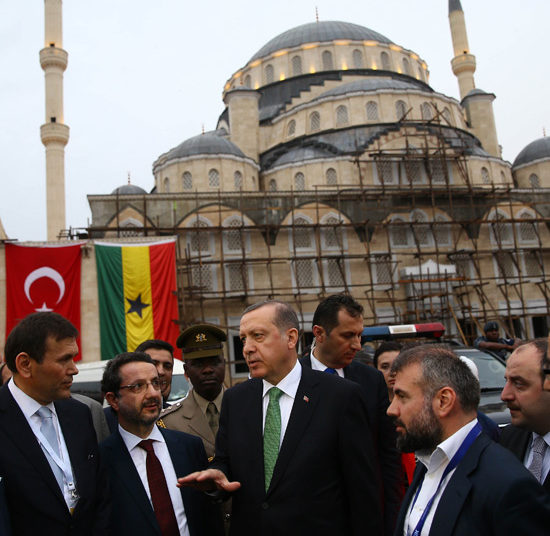Nordic Monitor
NGOs and organizations supported by the government of Turkish President Recep Tayyip Erdoğan are opening schools in African countries to spread a radical Islamist ideology and increase his influence on the continent, documents from an investigation into organized crime have revealed.
According to a classified wiretap that recorded the private conversation of pro-government businessman Abdullah Tivnikli and Erdoğan aide İbrahim Kalın, Tivnikli revealed that schools founded in Africa by Turkish agencies and government-linked foundations are educating students in line with Turkey’s political Islamist agenda and that they will be able to reach their political goals in a couple of years. The National Turkish Students Union (Millî Türk Talebe Birliği, MTTB), which promotes an Islamic state in Turkey, is seen as a guide for those schools, the documents confirmed.
The secret wiretap transcript details a call between Kalın and Tivnikli on January 14, 2013 at 13:08 hours. The conversation took place a day after the visit of then-Prime Minister Erdoğan to Gabon, Niger and Senegal as part of an African tour in January 2013. During his time in Africa, Erdoğan attended programs organized by schools run by the Aziz Mahmut Hudayi Foundation. Abdullah Tivnikli and his brother Fahrettin Tivnikli are founding members of the foundation.
“It was quite interesting that he [Erdoğan] visited only our schools,” Tivnikli, a long-time ally of Erdoğan who ran a company called Eksim Investment Holding until his death in November 2018, told Kalın. “We have just started. For instance, I told [foundation staff] in Ghana that there are around 10,000 [students], like [MTTB] youth. … You should act,” Tivnikli stated. “Good [projects] are being carried out, and more will be, Inshallah,” Kalın responded.
Kalın was deputy undersecretary of the Office of the Prime Ministry and chief foreign policy adviser to Erdoğan at the time. He currently works at Erdoğan’s palace as spokesperson and chief advisor.
Secret wiretap transcript of a call between Abdullah Tivnikli and İbrahim Kalın:
The MTTB has played an important role in Turkey in the political education of Islamist youth, including the founders of the ruling Justice and Development Party (AKP), among them Erdoğan, 11th President Abdullah Gül and former Speaker of the Turkish Parliament İsmail Kahraman. According to his official biography, President Erdoğan was actively involved with the student branch of the MTTB during his high school and university years.

The government-linked NGOs’ school projects in Africa are funded by Turkish agencies. For instance, Turkey’s Directorate of Religious Affairs (Diyanet) and the Aziz Mahmut Hudayi Foundation built two primary schools and a mosque complex in Ghana, the state-run Anadolu news agency reported. According to Anadolu, the mosque’s cornerstone was laid when President Erdoğan paid an official visit to the country in 2016.
In the conversation Kalın and Tivnikli discuss seeking the support of African leaders during the second Turkey-Africa Partnership Summit in order to build new schools in their countries. The summit, which was scheduled for 2013 in Turkey, was postponed, and Erdoğan and African leaders finally met in Malabo, Equatorial Guinea, November 19-21, 2014. A declaration and 2015-2019 Joint Implementation Plan were adopted at the summit.
“That is great, Brother. We should discuss those later. The Turkey-Africa [Partnership] Summit will be held here [in Turkey]. We will host all the African leaders,” Kalın told Tivnikli. “Sure. All of them are asking for money [to allow founding schools in their countries],” stated Tivnikli. “Brother, you should give [money] since you will profit from [the schools],” said Kalın.

Tivnikli was a close friend of President Erdoğan and also had served as a board member of the Kuveyt-Türk Participation Bank (Kuveyt Türk Katılım Bankası in Turkish, or Kuveyt Türk), a Turkish-based financial institution in which the Turkish government is one of the largest shareholders, from 1988 to 2001 and was vice chairman of the management board from 2005 to 2015. Kemal Kılıçdaroğlu, the leader of Turkey’s main opposition Republican People’s Party (CHP), has commented on Tivnikli’s connection to the president, referring to him as “the representative and depository of the most prominent political individual in Turkey.”
Kuveyt Türk was accused of knowingly and willingly participating in and facilitating fundraising campaigns for the terrorist Islamic State in Iraq and Syria (ISIS) and Jabhat al-Nusra (now known as Jabhat Fateh al-Sham). Moreover, US law firms filed another lawsuit against Kuveyt Türk in the Eastern District of New York in 2019, accusing it of aiding and abetting Palestinian militant group Hamas.

Both Tivnikli and Kalın were suspects in an organized crime network that was involved in fraud, forgery and abuse of power in fixing government contracts, tenders and public property sales. Kalin was acting as an illegal lobbyist for Tivnikli in the Turkish capital, resolving problems in energy deals the businessman pursued. In exchange, Tivnikli covered the education expenses of Kalın’s daughter, Rumeysa Kalın (Karabulut). The investigation was made public on December 25, 2013, but Erdoğan stepped in and hushed up the probe before it went to trial.
Today, Rumeysa Kalın Karabulut is working as an law clerk for US law firm Saltzman & Evinch. The Wall Street Journal previously reported that the Turkish government used Saltzman & Evinch to gather information about Erdoğan critics living in the US. Interestingly, the spouse of a Turkish diplomat, Rachel Cerqueira Denktas, also works for the firm.
In total 41 people, including Erdoğan’s son Bilal and Saudi businessmen Yasin al-Qadi, Mustafa Latif Topbaş, Cengiz Aktürk, Osama Qutb, Muaz Kadıoğlu, Orhan Kemal Kalyoncu, Ömer Faruk Kalyoncu, Avni Çelik and İbrahim Çeçen, were named as suspects in the major corruption case.













